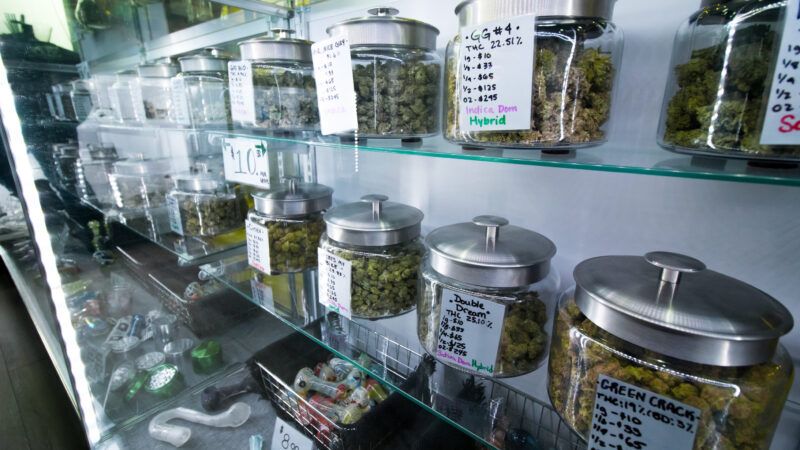California Bill Would Mandate That Legal Marijuana Products Come With Warning Labels, Brochures
An earlier draft of the bill, favored by the Los Angeles Times, would have required the labels be huge, with 12-point font and yellow backgrounds.

In 2016, California voters passed Proposition 64, which effectively legalized marijuana in the Golden State for anyone 21 or older.
But in the six years since, California has completely botched the implementation. State and local governments created artificial barriers to entry, like high taxes and a limit on the number of business licenses. Those caught selling without a license can be raided by state and federal authorities. The regulatory environment is so stringent that six years after legalization, California's illegal marijuana sales outnumber legal sales two-to-one.
Now, the Los Angeles Times editorial board is advocating for what it feels the legal pot industry needs: bigger warning labels.
"One of the goals of legalizing cannabis was to ensure that the pot Californians buy is relatively safe," the article begins. Legal products are tested, packaged, and labeled, with all ingredients and warnings listed.
"But the warning that's required is so tiny it's almost impossible to read," it continues. "And it doesn't mention anything about the risk of mental health problems associated with heavy marijuana use, which has been documented in a growing body of scientific research." The editorial mentions a proposed state bill that would require various warnings about marijuana use, "printed on the front of a package, covering at least one-third of it, typed in 12-point font on a bright yellow background."
The bill was ultimately "water[ed] down," which the editorial blames on the "pot lobby." But even in its current form, it would require the state to implement a universal cannabis labeling system "regarding the risks that cannabis use may contribute to mental health problems," and "reevaluate the regulations every 5 years." The editorial also praises a section of the bill which "requires the state to develop a one-page flier that would be available at all legal dispensaries describing the health risks linked with cannabis use, including the potential for psychosis and schizophrenia associated with using products containing high levels of THC."
There is certainly merit in requiring that, as part of the current labeling regime, marijuana sold in California must disclose its THC levels. But the case for mandating ostentatious warning labels and literature is both overly broad and unnecessary.
Overuse of alcohol can lead to heart disease, stroke, liver disease, various cancers, and mental health problems. While California requires businesses that sell alcohol to post signs stating that their products can "cause cancer, or birth defects or other reproductive harm," it does not yet require every liquor store to hand out pamphlets to its customers. Most people who drink alcohol understand the risks and choose to partake anyway.
In 2010, the Food and Drug Administration (FDA) introduced graphic warning labels for cigarette packs that included pictures of dead bodies and diseased organs to warn potential smokers about the consequences. Two years later, a federal court ruled that mandating the labels was a violation of the First Amendment and served no legitimate public health purpose, as the FDA failed to provide "a shred of evidence" of the labels' efficacy. In fact, virtually everybody knows that smoking is harmful, so a more aggressive warning label seems unlikely to dissuade anyone.
The California bill references studies in its claim that marijuana can cause numerous health issues, including "mental health problems" like "psychosis and schizophrenia." But the science on that claim is far from settled: While the bill cites a 2017 National Academies of Science, Engineering and Medicine (NASEM) study to claim "substantial evidence of the association of cannabis use with certain health harms," the study is more circumspect. Although the researchers found a "statistical association between cannabis use and the development of schizophrenia or other psychoses, with the highest risk among the most frequent users," the study clarified, "There are a number of proposed explanations for why the comorbidity of substance abuse and mental health disorders exists."
In 2019, Jeffrey Singer, a senior fellow at the Cato Institute and a member of its Department of Health Policy Studies, wrote about a scientific meta-analysis that determined that rather than a direct relationship in which marijuana causes psychosis, it could be the case that "cannabis use may be higher among individuals with a genetic liability that predisposes them to both cannabis use and the development of psychotic disorders." The evidence is simply not clear.
The legal marijuana industry is still struggling to get off the ground in California. Retailers and suppliers don't need more costly regulations, especially those based on incomplete data masquerading as settled science.


Show Comments (54)